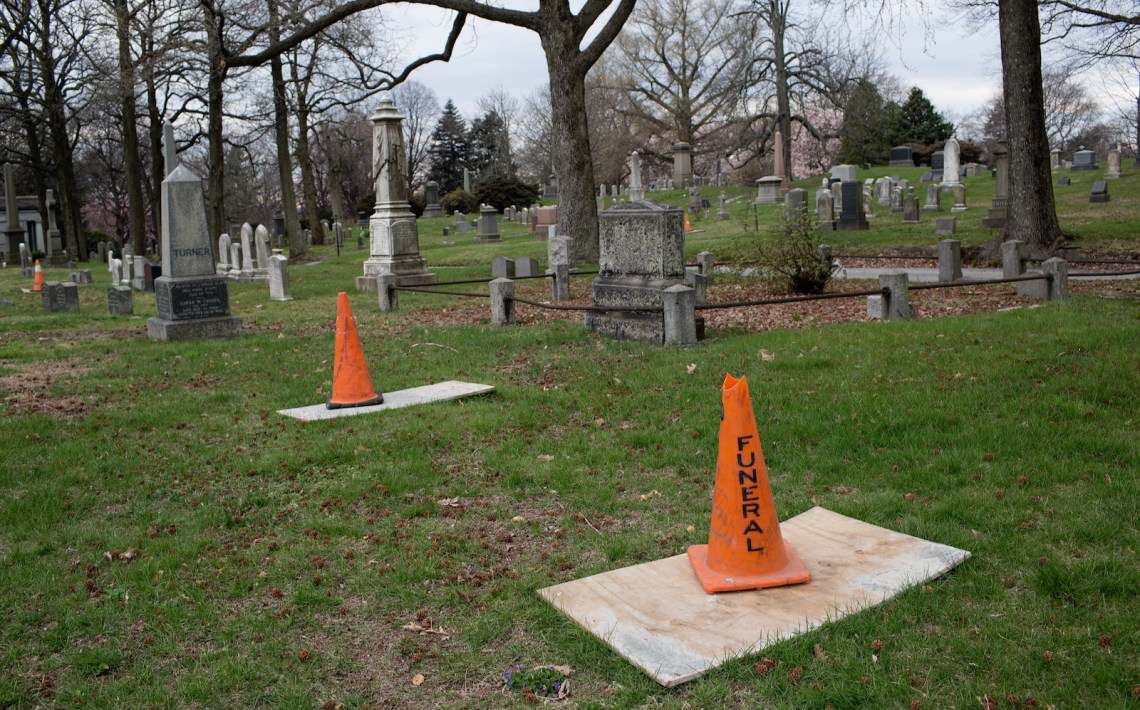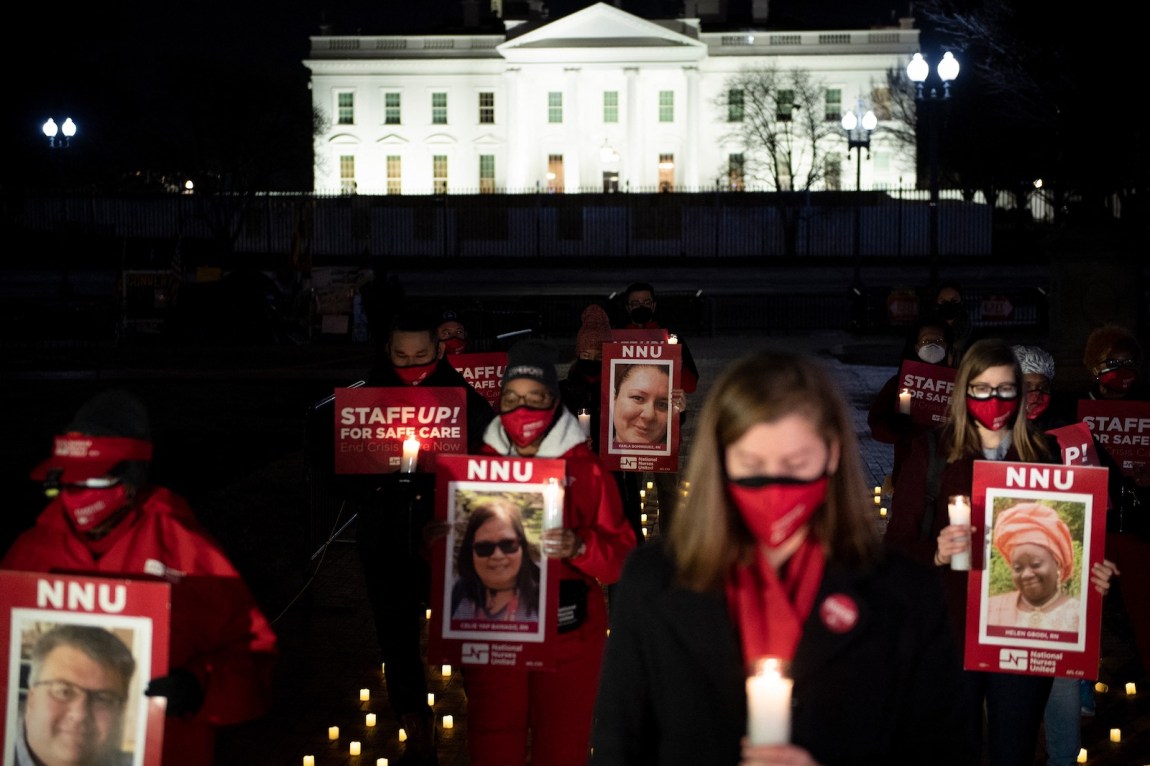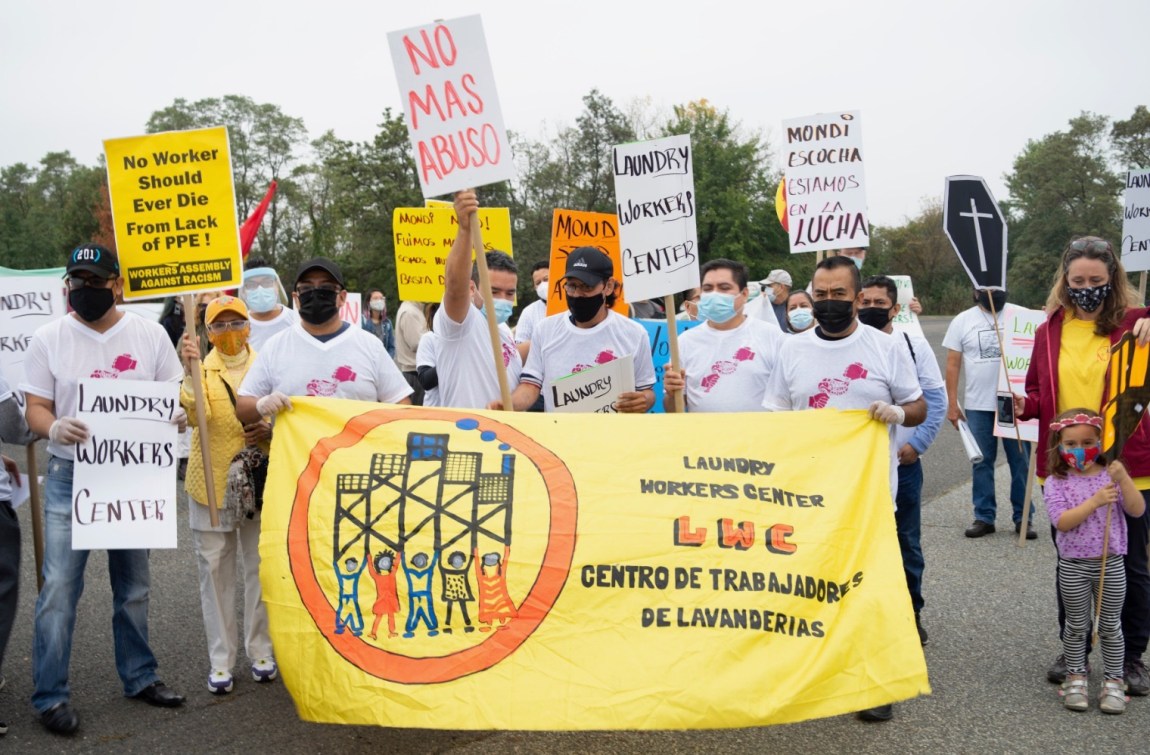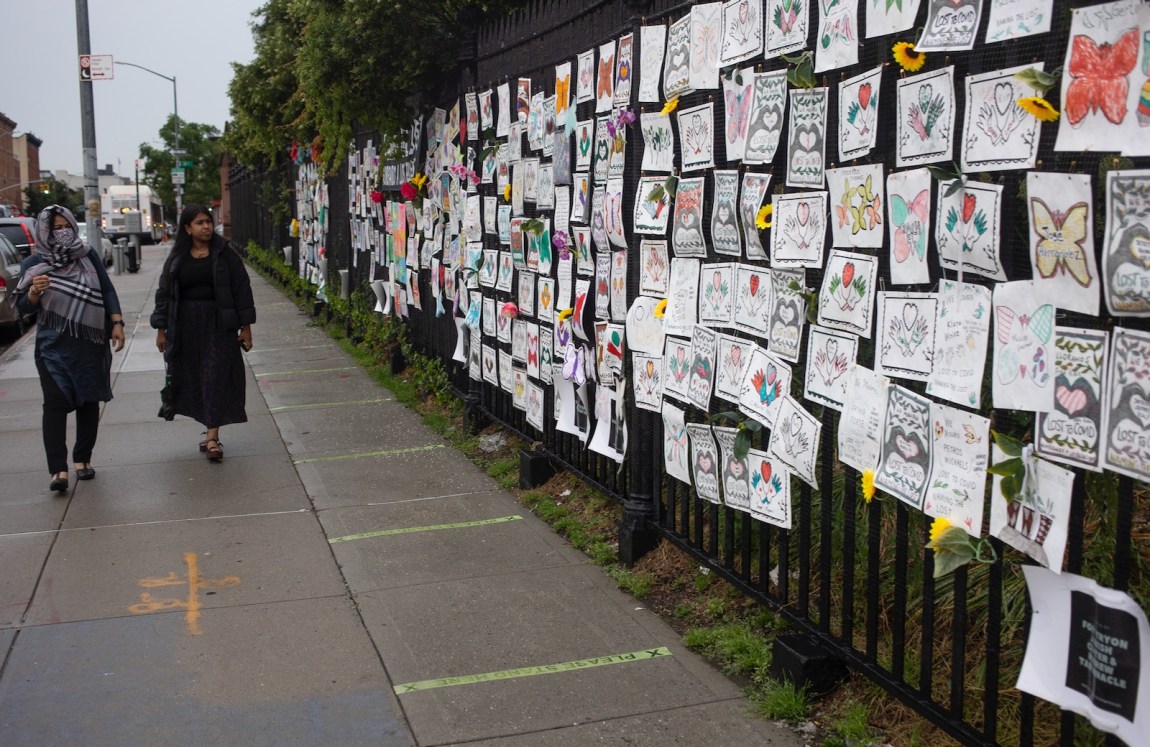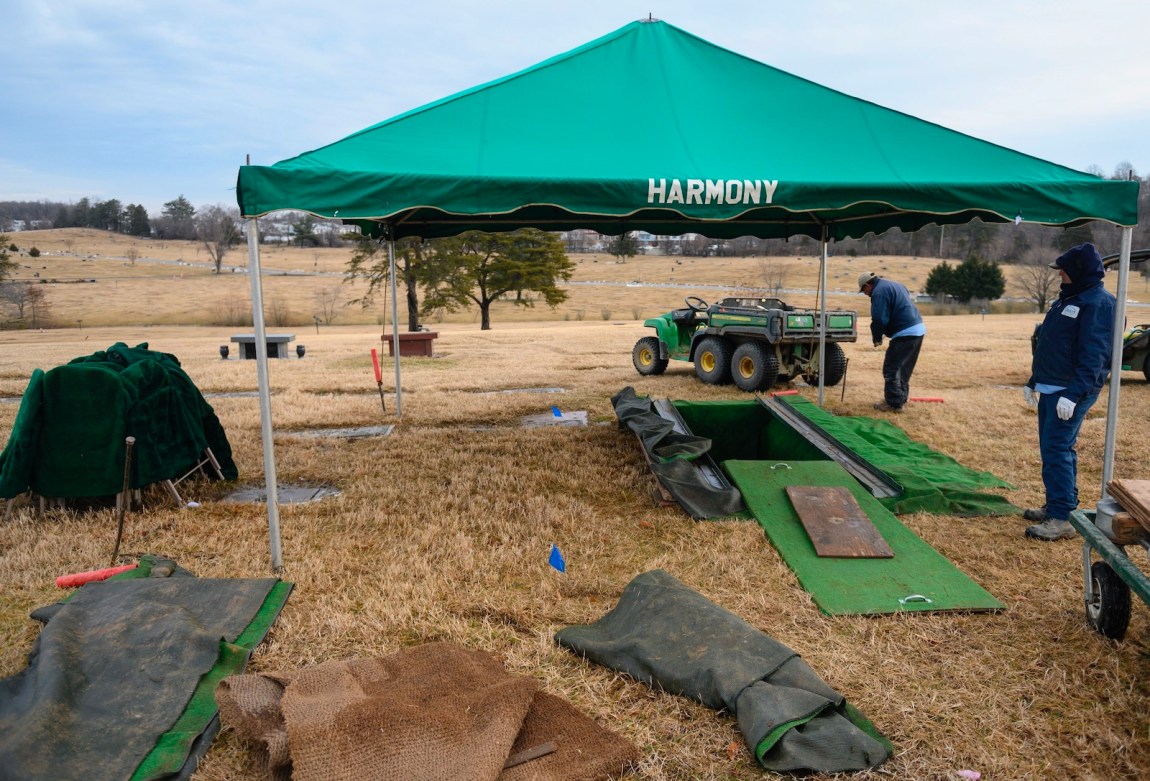“I remember, along with other nurses in my workplace, feeling like canaries in a coal mine,” said Elizabeth Lalasz of the early days of Covid-19, when every shift was a scramble to figure out how to treat the new virus, protective equipment was scarce, and the world seemed to have ground to a halt—except for so-called essential workers.
Lalasz works at John H. Stroger Hospital, a public safety net hospital in Chicago, and is a member of National Nurses United. We first spoke at the height of the first Covid wave, when she and other nurses had just held a national day of action demanding proper safety equipment for frontline healthcare workers. When we caught up this past March, two years into the pandemic, she was recently off her third long stint on a Covid-only ward, and she was feeling ground down. “My unit is one of the more stable units, but at least half of our nurses have left, retired, become traveling nurses, or have just quit altogether,” she told me. New recruitment to offset this turnover is hampered by the fact that nurses who haven’t worked on a Covid unit before need to be trained. But the shortage is exacerbated because so many hospital workers are getting sick with the newer, more transmissible variants, despite being fully vaccinated.
In many respects, hospitals are sustained by greater confidence than they had at the beginning of the pandemic: they know how to treat their patients, and have better, if hard-won access to protective equipment and other safety precautions. But each new virus mutation brings fresh challenges, and the rush to lift restrictions and shorten quarantine times has left Lalasz and her coworkers feeling ever more invisible.
The coronavirus pandemic in the US is approaching a grim, world-leading milestone: one million reported deaths. Around the world, the total is over six million. We have become inured to the mind-boggling numbers, separated as they are from human faces. But the refusal to reckon with the losses, and failure to take time to mourn, will haunt us. This has not been simply a failure of individuals, but an aggregated political decision that has left untold numbers of workers like Lalasz to bear the grief and misery alone.
The isolation measures demanded by the highly contagious nature of the virus have largely hidden its effects from a great many people, unless they or an immediate loved one have been seriously ill. Hospitals have mostly banned visitors, and so healthcare workers have been alone with the sick. “You connect with people and you carry their pain and their frustration and their anger and their joy and all that sadness,” she said. “You’re their lifelines, and to have that level of responsibility is just so enormous. It shatters you at some point.”
With trusted coworkers leaving, Lalasz feels alone on the job, and when she’s working with Covid patients, she intentionally stays away from friends on the outside, not wanting to risk bringing them the virus. “You feel like you’re on a razor’s edge, and you’re going to fall and nobody’s going to be there to catch you,” she said. Yet it also seems as though every time anyone she knows gets Covid or sees someone close to them get sick, she gets a call.
It was already true before the pandemic that, in our society, certain people perform the bulk of the emotional work, in the home or on the job. When the virus hit, that burden only multiplied. Yet, particularly once the first few months had passed, the vast collective social enterprise of not only treating illness, but bearing the grief went unacknowledged, surplus emotional value skimmed off their labor that allowed the rest of us not to face the true costs. That burden has been left to an ever-smaller number of designated carers to shoulder.
Now elected officials promise that lockdown is over; in the months since the Omicron wave peaked, mask mandates in most states have been lifted, widespread remote working has reverted to more in-person presence, and testing has dropped dramatically everywhere. But for the people still treating the sick, the crisis has never abated. “The whole idea of getting back to normal is an excuse for allowing people to continue to get sick without there being much of a discussion about it,” said Lalasz.
*
The effusive gratitude of the early pandemic days—the claps for care workers, the homemade signs in the windows thanking essential workers—is gone. Healthcare workers are facing threats of violence; fast food restaurants hang signs saying “nobody wants to work anymore.” Yet it is those essential workers, along with the elderly, who get sick and who die, who have lost family members and colleagues and friends and neighbors. Over and over, they told me that instead of “essential,” the word that describes their status is “expendable.”
Advertisement
Martin Olaya and Abraham Castañeda worked at a warehouse owned by Mondi, a paper and packaging multinational, in Leonia, New Jersey, with a tight-knit group of colleagues who’d been with the facility through multiple owners and changes. Castañeda had been there for twenty-six years and Olaya for twenty when the pandemic hit and their coworkers began to catch the virus. On the night shift, which Castañeda worked, they were down to three people from the usual fifteen because so many were infected. Management “said they couldn’t close, and that we had to work, so we went to work like that for two weeks,” he told me.
The managers, Olaya said, began to stay home and convey instructions by phone, but when the workers asked for protective equipment and for the warehouse to be disinfected, their requests were denied. Castañeda recalled telling a manager that he’d seen masks for sale nearby. “She said, ‘No, I’m not going to go look for them to give them to you.’” For Castañeda, who has diabetes, the refusal to communicate or to protect them was especially frightening.
Then their colleague Juan Romero died of the virus. Olaya asked for time off, and once again the workers requested that the facility to be closed and disinfected, but it was not until a second coworker, Abundio García, died that the place was cleaned—over a weekend, when it would be closed anyway. García’s brother, Carlos, also worked at the warehouse, and told his colleagues that managers had called his brother in the hospital to ask when he was returning to work.
They continued to press the company for protections, but in June 2020, Olaya, Castañeda, Carlos García, and sixteen other workers were simply told not to come back. After two decades at the warehouse, their employer was suddenly demanding proof of their immigration status. It felt like retaliation, particularly when, as immigrants, it was difficult for them to access unemployment benefits, let alone to find new jobs in the middle of the pandemic. “The day that I got fired, I couldn’t sleep at night,” Olaya said. “I started talking with my wife and kids about how it was not fair, that it was an injustice what they did to me and to all of my coworkers.”
The CDC’s charts that break down Covid-19 deaths by race and ethnicity are breathtaking. Because race is, to quote the late British social and cultural critic Stuart Hall, the modality through which class is lived, and because we know that essential workers are disproportionately Black, Native, and Latinx, we see that in the pattern of deaths: these groups died at higher levels than white people in every age bracket. While the Kaiser Family Foundation noted that those disparities have shrunk over time, they are down only from three times as likely to die from Covid-19 to twice as likely. We know also that comorbidities are distributed unequally, because the very quality of the air we breathe in our neighborhoods and workplaces is unequal, and because access to healthcare is rationed. But the effects of these contemporary inequities are also piled upon historic ones and, as Rupa Marya and Raj Patel write, precondition bodies to react differently, with ancestries of oppression passed on literally in human DNA.
“The way I look at healthcare, it’s an indication of what the society does to people, that reflects itself on their bodies,” Elizabeth Lalasz concurred. “I try to take that—we all do—and try to heal it. I’m not just talking about physically; I’m talking about mentally, emotionally, psychologically, psychosocially.”
The hospital where Lalasz works is a public safety-net hospital in Chicago, which means that it treats people who don’t have access to private care—those who are poor, undocumented, and incarcerated. These are people whose lives are not priorities in this country, she noted, but at such institutions even the doctors and nurses feel as though their employers “don’t care if we get sick and die. It’s just a numbers game.”
*
Despite some lip-service paid to essential workers, they and the most vulnerable members of society have ultimately been treated as collateral damage of the pandemic. As a result, grieving for them is tacitly regarded as unnecessary, as pointless or excessive. In particular, the deaths of the elderly—those sixty-five and over make up about 75 percent of Covid fatalities—were waved away. At the start of the pandemic, Texas Lieutenant Governor Dan Patrick said out loud what politicians aren’t supposed to say: “lots of grandparents” would be willing “to take a chance on [their] survival” in order for younger people to “get back to work.” In the UK, leaked messages showed British Prime Minister Boris Johnson opposing lockdown during the second Covid wave because “Hardly anyone under sixty goes into hospital (4 percent) and of those virtually all survive.”
Advertisement
Deb Howze is a care worker for people a generation older than her (though she is a grandmother herself), and the lack of concern for the lives of the elderly, particularly during the pandemic, gets to her. “[They] don’t have choices about what they want to do,” she said, telling me the story of one of her clients, Mary, who died shortly after being sent to a nursing home (to preserve these clients’ privacy, I am using first names only). Mary was in her early nineties but was still mobile, and had wanted, Howze said, to remain at home. But that decision was made for her by family members and doctors, and Howze never saw her again.
The intimacy of home care is something Howze, who has worked in a variety of positions during her career in healthcare and belongs to a union (an arm of the SEIU), prefers, even if it comes with additional demands and pays barely more than minimum wage. Another of her clients, Polly, was a hundred years old when they both caught Covid-19, and Howze moved into Polly’s South Minneapolis apartment to care for her while they both quarantined. She stayed there a month, helped throw a remote 101st birthday party for Polly, and despite their both being at high risk (Howze has elevated blood pressure) they made it through.
But nobody, Howze noted, is hired to take care of the frontline workers. The strange intimacy of her job does not involve any reciprocal care—Howze is not, of course, treated as part of her clients’ family—but there have been times when she has needed it. She survived her own bout with Covid only to be blindsided by the suicide of her thirty-year-old son, Timothy, in April 2021. After a sudden mental health crisis and brief hospitalization, he took his own life. To her, the healthcare system, pandemic-stressed but also with its built-in inequities, had failed him. She was left wondering, “Had he been white, would they have gone a little further?”
She struggles still with her sorrow, baffled by how suddenly everything went wrong. He’d been working, raising his children, doing well—even his apartment, she said, was neat and organized when she went in after his death. With her sadness, she feels anger: at the government that hasn’t taken public health seriously, at mental health care services shut down as “non-essential,” at the myriad other policy failures that came with the pandemic. “Look at the people that lost their parents, their children, their husbands, their wives,” she said. “People’s lives are upside down. Somebody’s going to have a mental crisis, somebody’s going to commit suicide.”
The philosopher Judith Butler, known for her work on gender, has turned her attention to grief in recent years. Grieving, she writes, “changes you possibly forever, and that mourning has to do with agreeing to undergo a transformation the full result of which you cannot know in advance.” For the most part, Howze’s clients, even if they are curious enough about her to learn of her loss, reflexively expect her to compartmentalize it and do her job. But grief is not something one can simply work at, control, or resolve.
Unpermitted grief is one part of the growing mental health crisis that the pandemic has brought in its wake. Healthcare workers like Howze and Lalasz carry new anxiety, new depression, and post-traumatic stress disorder—conditions that can also affect their physical health, and their immunity. “I wish it were just accepted that it’s okay for us to talk about it, rather than ‘let’s get over it’ or ‘it’s not so bad,’” Lalasz said.
Covid has separated us into what I took to calling “Margaret Thatcher units,” drawn from Thatcher’s famous statement usually rendered as “There is no such thing as society. There are individual men and women and there are families.” During lockdowns immediate families were allowed to remain together, and the rest of us were isolated, and that is how we took our losses. But grief, Butler notes, is never a purely individual process:
In this experience something about who we are is revealed, something that delineates the ties we have to others, that shows us that those ties constitute a sense of self, compose who we are, and that when we lose them, we lose our composure in some fundamental sense: we do not know who we are or what to do.
Grief is about the connections we have with others. Yet, among those not immediately touched by it, the mourning of others is seen as a hindrance to the return to normal, as are the precautions that would prevent more deaths, and more grief. “The individualizing means, ‘Hey, it’s not so bad for me, so what are we so worried about?’” Lalasz observed. She has tried, when she can, to convey what she has experienced: how it feels to watch someone who had been improving take a turn for the worse, how to talk to people struggling to breathe. But those conversations are easy to avoid, and there has been very little public acknowledgment of loss.
When Joe Biden—sometimes dubbed the “mourner in chief,” a role he embraced at first—began his presidency marking the 400,000 Americans (at the time) lost to the virus, saying, “To heal, we must remember. It’s hard sometimes to remember. But that’s how we heal.” The toll has more than doubled since then, but commemorations from the White House have stopped. Instead, the administration has leaned into the idea that Covid is about to be over—even as another wave of infections hits White House staff.
But there is little political mileage in reality-based public health policy. For as the feminist scholar Sara Ahmed has explored, those who raise the alarm are often punished for it, as if they are the ones creating the crisis. Look at the teachers’ unions, which were demonized—sometimes by their supposed allies—for pushing for increased safety precautions before sending children back into schools. Teachers who were leery of passing on the virus in-person became the problem, as though Covid would pose less of a risk if they just shut up and marched back into the classroom.
To call for collective grieving is not simply to call for emotional catharsis. Rather, it is to say that this lack of attention to our losses both springs from and leads to concrete failures of public health, safety, and care. Dealing with death and loss is hard enough, but for care workers like Lalasz and Howze, it was exacerbated by underfunding, inadequate resources, and insufficient support.
“My union called it moral distress,” Lalasz said. Others have called it “moral injury.”
From the first time I spoke with Lalasz, in early 2020, she told me of the frustration felt by nurses everywhere that they did not have proper protective equipment and were reusing masks and gowns. Later, when the first wave abated, hospitals that had touted their healthcare heroes tried to shortchange them, despite the CARES Act funding that was pouring in. Lalasz was one of many hospital workers around the country who went on strike between 2020 and 2022.
“You stare down the throat of death, basically, and you’re not sure if you’re going to walk out and not have [Covid],” she said. “And then we sit back and are told, ‘Oh, by the way, we don’t have the money for you. You have to take a wage cut. We’re not going to give you decent staffing. We need that money for something else.’”
The $15 billion in Covid funding sliced from the latest spending bill in Congress, when US expenditure to tackle the virus was already insufficient, is another insult to those scrambling to hold the system together with duct tape, prayer, sweat, and tears.
The virus tore through nursing homes and other long-term care facilities, killing residents and staff at astronomical rates. Early in the pandemic, nearly half of all deaths were in such institutions, and in New York, the cover-up of the real death toll helped force Governor Andrew Cuomo from office. Those conditions, Howze said, also underscored the need for home care, yet funding to pay people like her continues to be a political football, as even the most pared-back version of Biden’s proposed funding of home care has not passed. A dark irony that illustrates how broken the system is: on the wage she’s on, Howze can’t even afford the health insurance she’s offered.
Nate Holdren, a legal historian writing at Harvard Law School’s Petrie-Flom Center blog, called the pandemic an example of “social murder,” a term he took from Friedrich Engels’s The Condition of the Working Class in England. The damage inflicted by capitalism, Holdren wrote, creates problems for the government that it solves by depoliticizing its choices, making a chosen path seem inevitable. Covid should have forced us to see the political choices behind outcomes we were told were inevitable—but if we don’t linger on the grief, then we don’t feel the anger.
Characteristically neoliberal ideas of liberty and personal responsibility also underpin the dynamic. This conception of freedom, the political theologian Adam Kotsko has observed, rests on a Thatcherite asocial theory of human nature: that we are all, ultimately, on our own (or with only our families, if we’re lucky). As he wrote in Neoliberalism’s Demons (2018), such an ideology has made “demons of us all, confronting us with forced choices that serve to redirect the blame for social problems onto the ostensible poor decision making of individuals.” And the flipside of bootstrapping ideology is victim-blaming.
This shrinking of social obligation to a singular, personal level leads to people’s refusal to wear masks or get vaccinated to protect others during a pandemic. But it also led the Biden administration to feel justified in scolding the vaccine-hesitant in December 2021, reinforcing the emphasis on individual responsibility rather than collective care: “We are intent on not letting Omicron disrupt work and school for the vaccinated,” he said in a public address. “You’ve done the right thing, and we will get through this. For the unvaccinated, you’re looking at a winter of severe illness and death for yourselves, your families, and the hospitals you may soon overwhelm.”
*
In a way that I did not understand until my father died in 2018, grieving is not just about saying goodbye to the past or letting go of someone; it is also about the future. Such a profound and intimate loss wiped out my entire ability to imagine my life moving forward. It was not that my father was such an integral part of my day-to-day—indeed, he lived several states away, and we had lately been at odds, mostly over politics. But losing him changed my understanding of what was possible, in my life and in the world. The worst had happened; in its wake, it seemed as if anything could happen now.
Grieving ground my life to a halt for a while. It was both a thing that needed to happen and something that had no linear progression, no steps to take, no work I could do to make it proceed faster. In that way, it arrested time. Walter Benjamin, a man who knew something about grief, wrote: “Marx says that revolutions are the locomotives of world history. But the situation may be quite different. Perhaps revolutions are not the train ride, but the human race grabbing for the emergency brake.” It was this definition of revolution to which I returned because it dovetailed so well with the physical experience of grief, the temporality of it. For if an individual person’s grief halts their life’s forward motion, our collective grief can, in fact, stop the locomotive barreling toward disaster.
A society that cannot grieve a million dead was always likely to respond badly to a major public health crisis. Martin Olaya and Abraham Castañeda were not permitted to stop working to protect themselves, let alone mourn men they’d worked alongside for twenty years. To make space for that grief would require a focus on collective care and cooperation, and that we prioritize public health and safety over profit. This would necessarily disrupt business as usual. Yet pulling the emergency brake would be a start—a start to valuing people’s lives while they are still here, and to a society that would give all of us the care we need when we need it.
It was the power of their grief that finally brought a measure of justice to the Mondi workers. The anger haunted Olaya and he spoke with the other fired workers about it; they found their way to the Laundry Workers Center, an organization that supports immigrant workers like themselves, and began holding pickets outside the warehouse. The organizing was difficult, Olaya said, but the workers were committed—even when the meetings and the pickets interfered with the new jobs they were able to get. They got support from community members, in New Jersey and overseas at other facilities owned by Mondi, but what seemed to bring the company to the table was a march through Leonia in remembrance of Abundio Garcia and Juan Romero. The marchers bore signs in English and Spanish with the names of their colleagues that asked, “Why have you forgotten those who died of Covid?”
No settlement could bring back their lost comrades, but part of what they won, besides an undisclosed payout, was improved conditions for those who remained at the warehouse. “I hope that this serves as an example for other workers,” said Olaya, “that if the same thing happens to you, don’t stay silent, raise your voices, at the end there is going to be justice.”


